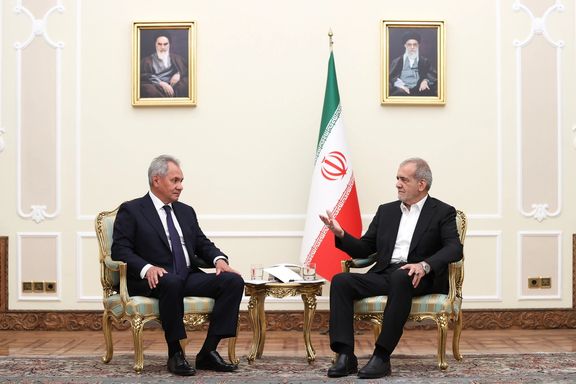The world is anxiously watching the rising tension between Iran and Israel as reports speak of a retaliatory Iranian attack sooner than later.
Pezeshkian told Shoigu that "Iran is by no means seeking to expand the scope of the crisis in the region, but this regime will certainly receive a response for its crimes and arrogance."
The exact reason for Vladimir Putin’s confidant, Shoigu, on Monday remained unclear. Whether Russia’s former long-time defense minister went to Tehran to calm the situation or discuss military matters ahead of a possible war with Moscow’s close ally remains unknown.
Pezeshkian was also quoted as telling the Kremlin envoy that "Russia has been one of the countries that has stood by the Iranian nation during difficult times. Developing relations with this strategic partner is a priority of the Islamic Republic of Iran's foreign policy, and there is a need to expedite the implementation of the agreements made between the two countries."
He also repeated the Islamic Republic’s standard position that together with Russia, China and others, Tehran will oppose US power and influence. "We believe the era of dominance by certain powers, including the United States, has passed, and the shared positions and cooperation between Iran and Russia in promoting a multipolar world will certainly lead to greater global security and peace."
Meanwhile, US Secretary of State Antony Blinken said later on Monday Washington was engaged in intense diplomacy to ease tensions in the Middle East and urged all parties to refrain from escalating.
Speaking after his meeting with Australian Foreign Minister Penny Wong, Blinken also said it was crucial that a ceasefire deal in Gaza is reached and called on all parties to find ways to come to an agreement.
Also on Monday, State Department spokesperson Matthew Miller said the United States has been urging countries through its diplomatic engagements to tell Iran that escalation in the Middle East is not in their interest.
Speaking at a daily briefing, Miller said this was a "critical moment" for the region and that U.S. Secretary of State Antony Blinken was working the phones to help calm the tensions, but also said Washington was preparing for all possibilities.
Two American destroyers, the USS Laboon and USS Cole, shifted from the Gulf of Oman to the Red Sea, in the direction of Israel, The Washington Post reported on Monday citing defense officials.
"The aircraft carrier USS Theodore Roosevelt remained in the Gulf of Oman as of this morning," the report added.
The US Navy played a key role in the interception of Iran's large-scale missile and drone attack on Israel in April.
A Pentagon spokesman stated Monday that the United States has not observed any specific movements in Iran so far that would indicate potential attacks on Israel in the coming hours, according to Sky News Arabia.
Monday evening local time three explosions were heard in Sepahan-Shahr, Isfahan province, according to Iran's state-run media and citizens' reports.
Mohammadreza Jan-Nessari, the Deputy Governor of Isfahan, said "the sounds of the explosions were caused by a training exercise."
Isfahan province is home to multiple Iranian military and nuclear facilities, some of which have been targeted in suspected Israeli strikes in the past.







